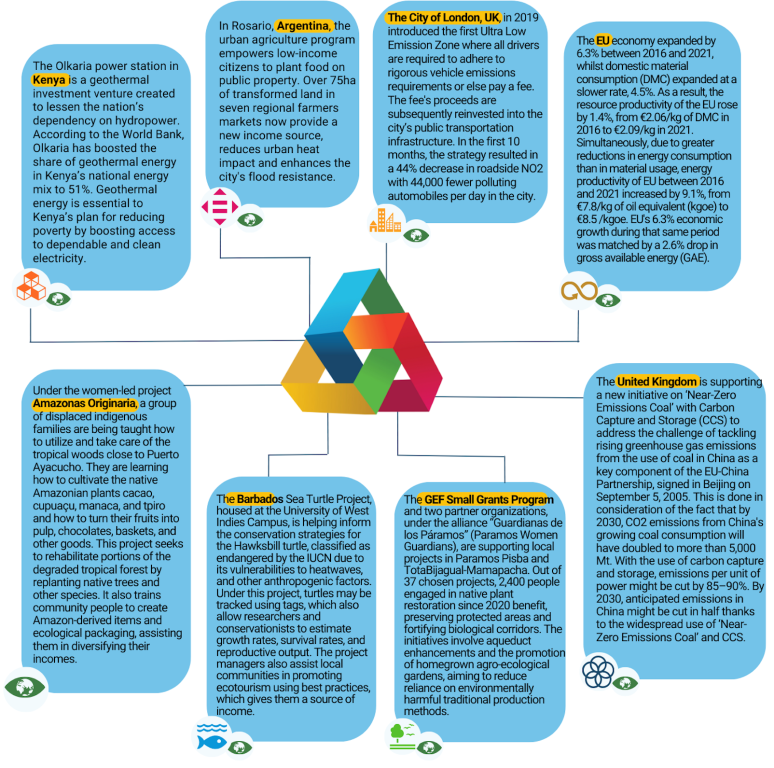
Climate Action and Synergies
Background
We must change course. Without synergies, the Sustainable Development Goals (SDGs) and climate objectives remain out of reach. The evidence is clear: addressing climate change and achieving the SDGs are inextricably intertwined. Co-benefits far outweigh trade-offs. By maximizing these synergies, we can also bridge investment gaps worth trillions of dollars. Synergistic action should be a required component of national commitments, reporting and financing for climate and development goals. We must act on the climate emergency and sustainable development together now, or we risk not solving them at all.
In May 2023 UNDESA and UNFCCC Secretariat co-convened the Expert Group on Climate and SDG Synergy. The Group consists of 14 renowned experts from diverse thematic and geographic backgrounds who were given the task of developing the First Global Report on Climate and SDG Synergies.
This report demonstrates that aggressively acting on climate and development in an integrated and synergistic way is an important opportunity to achieve the course correction the UN Secretary- General has called for. It highlights some of the challenges but also the opportunities if the international community is seriously committed to enhancing these synergies and thereby addressing these challenges.
The report is designed to provide a broad overview of available data and evidence, insights from experts on the frontlines, and recommendations for enhancing synergistic action across the 2030 Agenda and the SDGs. This first edition will form the basis for future iterations, which will entail a wider scope of sectors, and thematic areas and deep dives on specific issues pertaining to strengthening and operationalizing synergic climate and SDG actions at all levels.
Launch event | September 13, 9:30 - 10:15 EDT
Key Messages
1 | TACKLING INTERLINKED CRISES
We must solve the climate emergency and sustainable development challenges together, or we will not solve them at all. As our world grapples with interconnected crises, the urgency of addressing climate change and sustainable development together is undeniable.
- Over 50 per cent of SDG targets lack sufficient progress; 30 per cent have stalled or reversed.
- For the first time in three decades, key areas like childhood vaccination and income equality between countries have regressed.
- Global temperatures have already risen by 1.1°C, and we are on track to exceed the critical 1.5°C threshold by 2035. Vulnerable regions experienced 15 times higher human mortality from floods, droughts and storms between 2010 and 2020.
2 | EVIDENCE OF SYNERGISTIC ACTION
Pursuing the 2030 Agenda and the Paris Agreement in concert can significantly and efficiently advance both agendas. Extensive evidence suggests that implementing these intertwined agendas together can drive global progress efficiently, with gains from integrated action outweighing losses.
- Evidence links climate action to 80 per cent of 2030 Agenda targets, providing opportunities for impactful policies.
- Aligning climate and SDG efforts could boost economic output by a staggering USD 43 trillion by 2070.
- Implementing the Paris Agreement through transitioning to renewables and improving energy efficiency could create 24 million jobs by 2030.
- Health and agricultural co-benefits can offset climate policy costs and boost global GDP.
3 | BRIDGING FINANCIAL GAPS
Evaluating the co-benefits and trade-offs between climate action and SDGs is critical to increase the cost-effectiveness of interventions and ensure a just and equitable transition. Strategizing interconnections could optimize resource allocation and address the ongoing financial challenge for climate and developmental objectives through a synergistic approach.
- Despite climate finance almost doubling in the last decade, there remains a significant shortfall of USD 4.3 trillion in annual finance flows by 2030 to be able to meet a 1.5°C global climate scenario and avoid the worst impacts of climate change.
- A shift to a low-carbon and resource-efficient economy could generate 100 million jobs by 2030 but might risk 80 million jobs without a just transition.
- Solely focusing on climate targets could put 84 million more people at risk of hunger by 2050.
- Meeting nearly 70 per cent of SDG targets by 2030 requires adaptation measures in urban areas and vulnerable countries.
4 | INTEGRATED PLANNING
The transition from isolated approaches to integrated planning is underway but needs acceleration. More countries are integrating SDG and climate action, yet overcoming knowledge, political, institutional and economic barriers is essential for widespread policies addressing both agendas.
- While there is significant overlap between multiple SDGs and climate actions by governments under their nationally determined contributions (NDCs) to the Paris Agreement, only 23 out of 173 NDCs explicitly reference the SDGs.
- Simultaneous development and climate efforts can bridge investment gaps and yield USD 4 in co- benefits for every USD 1 investment.
- Countries with integrated frameworks for policy coherence, including 96 per cent that involved gender equality, are advancing more rapidly in their NDC commitments.
- Synergies abound in submitted long-term low- emission development pathways (LT-LEDS), including co-benefits for economic growth (91 per cent), job creation (83 per cent), reduced inequalities (75 per cent), improved health (72 per cent), and sustainable cities.
5 | GLOBAL ROADMAP FOR ACTION
A clear roadmap for accelerated synergistic action is needed to align efforts and bring the 2030 goals closer to reality. To promote integrated action, the strategy involves mapping high-impact synergy areas and offering actionable steps to enhance synergies effectively at all levels, including:
- Establishing a global knowledge platform for policy makers to access best practices.
- Creating a framework for action for policymakers to identify, review and evaluate complex synergistic actions.
- Addressing investment gaps through financial reform for climate and development.
- Leveraging cities, with 70 per cent of the global population expected to live in urban areas by 2050, to maximize co-benefits and reduce costs.
Mapping the Evidence



